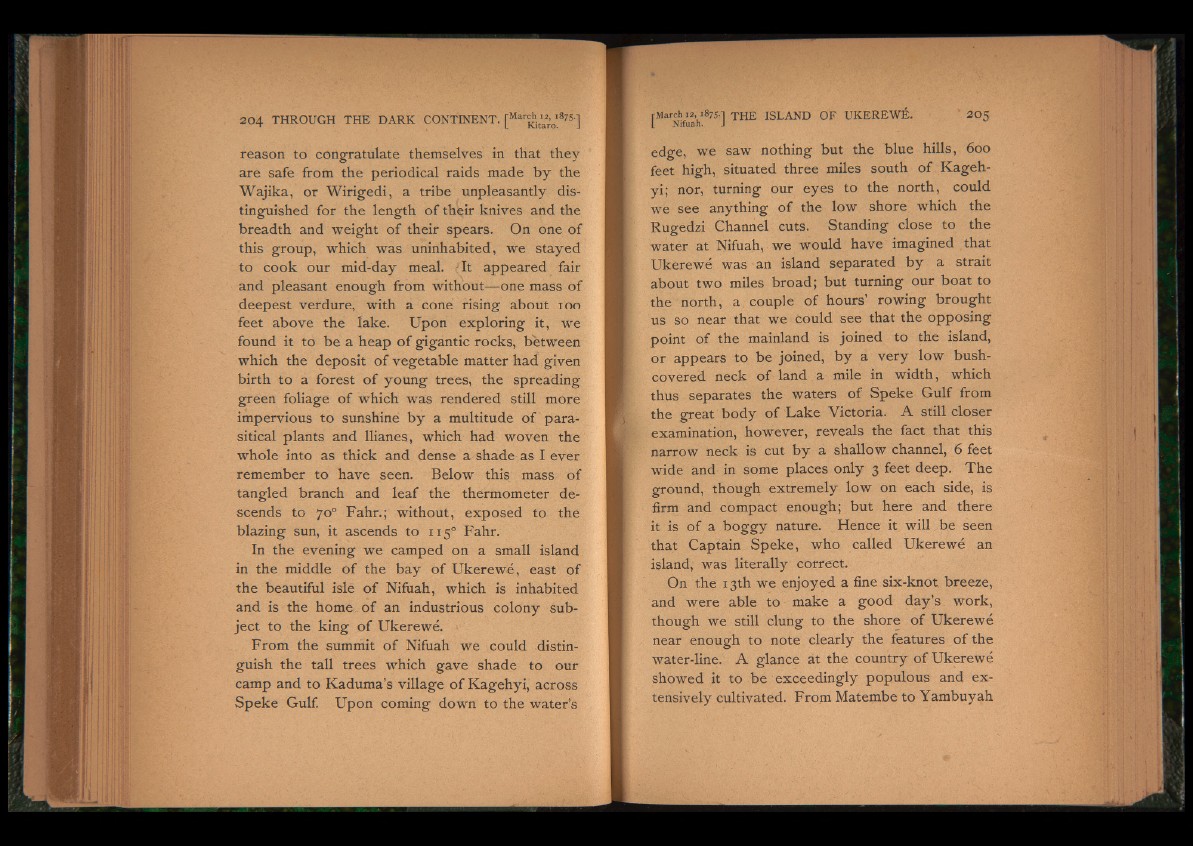
reason to congratulate themselves in that they
are safe from the periodical raids made b y the
Wajika, or Wirigedi, a tribe unpleasantly distinguished
for the length o f their knives and the
breadth and weight o f their spears. On one of
this group, which was uninhabited, we stayed
to co o k our mid-day meal, T t appeared fair
and pleasant enough from without— one mass o f
deepest verdure, with a cone rising about too
feet above the lake. Upon exploring it, we
found it to be a heap o f gigantic rocks, between
which the deposit o f vegetable matter had,given
birth to a forest o f young trees, the spreading
green foliage o f which was rendered still more
impervious to sunshine b y a multitude o f parasitical
plants and llianes, which had woven the
whole into as thick and dense a shade as I ever
remember to have seen. Below thi§ mass, o f
tangled branch and le a f the thermometer descends
to 70° Fahr.; without, exposed to the
blazing sun, it ascends to 1 150 Fahr.
In the evening we camped on a small island
in the middle o f the b a y o f Uke rewe , east o f
the beautiful isle o f Nifuah, which is inhabited
and is the home^ o f an industrious colony subje
c t to the king o f Ukerewe.
From the summit o f Nifuah we could distinguish
the tall trees which gave shade to our
camp and to Kaduma’s village o f Kagehyi, across
S p ek e Gulf. Upon coming down to the water’s
rMarch 12, 1875.-] THE ISLAND OF UKEREWE. 205
L Nifuah. J
edge, we saw nothing but the blue hills, 600
feet high, situated three miles south o f K a g eh yi;
nor, turning our eyes to the north, could
we see anything o f the low shore which the
Rugedzi Channel cuts. Standing close to the
water at Nifuah, we would have imagined that
Ukerewe was an island separated b y a strait
about two miles broad; but turning our boat to
the north, a couple o f hours’ rowing brought
us so near that we could see that the opposing
point o f the mainland is joined to the island,
or appears to be joined, b y a v e ry low bush-
covered neck o f land a mile in width, which
thus separates the waters o f Speke Gulf from
the great body o f Lake Victoria. A still closer
examination, however, reveals the fact that this
narrow neck is cut b y a shallow channel, 6 feet
wide and in some places only 3 feet deep. The
ground, though extremely low on each side, is
firm and compact enough; but here and there
it is o f a b o g g y nature. Hence it will be seen
that Captain S p ek e, who called Ukerewe an
island, was literally correct.
On the 13th we enjoyed a fine six-knot, breeze,
and were able to make a good d a y ’s work,
though we still clung to the shore o f Ukerewe
near enough to note clearly the features o f the
water-line. A glance at the country o f Ukerewe
showed it to be exceedingly populous and e x tensively
cultivated. From Matembe to Yambuyah